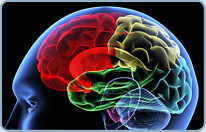I think his observation is rather fascinating and makes perfect sense. True motivation stems from emotions. If you want to motivate someone, create a situation where that person is emotionally invested or attached. That is precisely why incentives work, whether in parenting, education or work environments. They motivate us by connecting the particular task or achievement to a strong emotion. Fear, happiness and sadness are three of the most important motivating emotions. However, often society or culture dictates connections for us. For example, in our society today being wealthy, young, thin and attractive is often associated with being happy while being old, overweight, and poor is affiliated with sadness. Therefore, it should come as no surprise that some of us feel disappointed when we do not feel or experience the associated feelings of happiness and joy when we acquire lots of money, as promised by society's formula (i.e., happiness <--> wealth). Or we are surprised when we see old, overweight people having fun and experiencing happiness. I guess the message here is that we should create our own connections based on individual experiences. In reality, this would not be very efficient. We need not experience a car accident to know it's bad or abuse drugs to comprehend their detrimental effects. We can and should learn from other people's experiences; however, we need to recognize that our emotions play a vital role in our decision making process. In another words, when we are emotionally attached or invested to a certain cause, person, object, ideology, etc., then we are very highly motivated by that cause or ideology without much logical thinking or a screening process by our brain of the details. Just because society tells us that a very nice sports car will make us experience happiness does not mean it's true. Between the emotion of happiness and the motivation to buy an expensive sports car, we have to allow our logical thinking brain to provide input and have a say.
If you want to motivate someone, create a situation where that person is emotionally invested or attached. That is precisely why incentives work, whether in parenting, education or work environments. They motivate us by connecting the particular task or achievement to a strong emotion. Fear, happiness and sadness are three of the most important motivating emotions. However, often society or culture dictates connections for us. For example, in our society today being wealthy, young, thin and attractive is often associated with being happy while being old, overweight, and poor is affiliated with sadness. Therefore, it should come as no surprise that some of us feel disappointed when we do not feel or experience the associated feelings of happiness and joy when we acquire lots of money, as promised by society's formula (i.e., happiness <--> wealth). Or we are surprised when we see old, overweight people having fun and experiencing happiness. I guess the message here is that we should create our own connections based on individual experiences. In reality, this would not be very efficient. We need not experience a car accident to know it's bad or abuse drugs to comprehend their detrimental effects. We can and should learn from other people's experiences; however, we need to recognize that our emotions play a vital role in our decision making process. In another words, when we are emotionally attached or invested to a certain cause, person, object, ideology, etc., then we are very highly motivated by that cause or ideology without much logical thinking or a screening process by our brain of the details. Just because society tells us that a very nice sports car will make us experience happiness does not mean it's true. Between the emotion of happiness and the motivation to buy an expensive sports car, we have to allow our logical thinking brain to provide input and have a say.
We allow our emotions to motivate us and drive our actions without much thought because we trust the information we receive from external sources (society, tv, ads, friends, news, etc.). This would be fine if all external information sources were reliable and accurate which brings us to one of the biggest challenges facing the humanmind today: to determine the most accurate and reliable information/ source of information when making decisions. The internet provides us with a vast variety of information and sources, everything from individuals to religious, political, for-profit or non-profit organizations. Each has its own agenda and reasons for sharing information and might be reluctant to share certain information that would have negative consequences to the organization. Therefore, it is more important than ever that we utilize logical thinking to act as a filter between our emotions and actions.

No comments:
Post a Comment